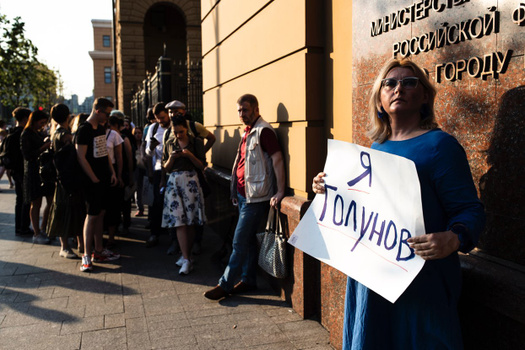
‘You can’t be proud of a country where this happens’ Hundreds spend eight hours rallying for arrested journalist Ivan Golunov outside Moscow’s Police Headquarters
Мы рассказываем честно не только про войну. Скачайте приложение.
On June 6, police officers in Moscow arrested Meduza special correspondent and investigative journalist Ivan Golunov. He is accused of possessing controlled substances with the intent to distribute, and officers say they found packets containing illegal drugs in his backpack, and later at his apartment. Golunov says the drugs were planted. After police arrested him, they beat him up, refused to let him speak to a lawyer for several hours, and withheld food for more than a day. Meduza is confident that the charges against our reporter are false. At 4:00 p.m. on June 7 (Golunov’s arrest was only made public the next day), people in Moscow, St. Petersburg, Perm, and other cities across the country staged demonstrations in support of Ivan Golunov. At 38 Petrovka Street, outside Moscow’s Police Headquarters, several hundred people lined up for more than eight hours to join a series of one-person pickets (the only type of public demonstration allowed in Russia without an advance permit). Meduza special correspondent Kristina Safonova was in the capital to witness the event.
At about four in the afternoon, Novaya Gazeta journalists Ilya Azar and Alisa Kustikov meet at Strastnoy Boulevard, where they prepare posters for a picket in support of their colleague, Meduza investigative journalist Ivan Golunov, who’s been arrested on suspicion of possession of a large amount of narcotics with intent to distribute.
Golunov was arrested in central Moscow in broad daylight a day earlier, on June 6, but the public wasn’t informed for nearly 12 hours. Late into the night, Golunov wasn’t allowed to speak to a lawyer or notify his loved ones. When searching the journalist’s backpack, officers found a packet containing a narcotic substance. The police initially refused to take forensic samples from Golunov’s backpack and hands, and they declined to carry out a medical examination to determine if he had any illegal drugs in his system. The officers also withheld food and sleep. Golunov maintains his innocence, and his colleagues believe him. The hundreds of people who rallied in his defense on Friday said they’ve no doubt that Ivan is being targeted because of his investigative journalism.
Ilya Azar, one of the picket’s organizers, was the first to demonstrate outside Moscow’s Police Headquarters at 38 Petrovka Street. While Azar stood there with his banner, Alisa Kustikov waited at the corner of the building. Several police officers watched.
The arrests began when Pavel Kanygin, another Novaya Gazeta reporter, took Azar’s place. Kanygin came to the picket with his wife and their child. An officer approached him and asked to see his identification. The official then took out a red notepad and spent several minutes copying the information from Kanygin’s passport. When journalists asked the officer why he was conducting an inspection, he explained that it was illegal to picket while carrying a backpack, because its contents were unknown. To examine Kanygin’s belongings, the police escorted him to one of three nearby police buses, which soon drove off with the journalist.
After Kanygin, the police started arresting anyone outside the building carrying a poster. At this point, the only people being taken away to police buses were journalists. The bus was soon filled with Ilya Azar, Viktor Shenderovich, Alexander Polivanov, Grigory Tumanov, and Viktoria Ivleva, with some already writing on their phones from inside the vehicle that the formal reason for their arrest was their failure to observe the “50-meter rule,” which requires people to stand at least 165 feet apart from one another in order for the demonstration to qualify as a one-person picket.
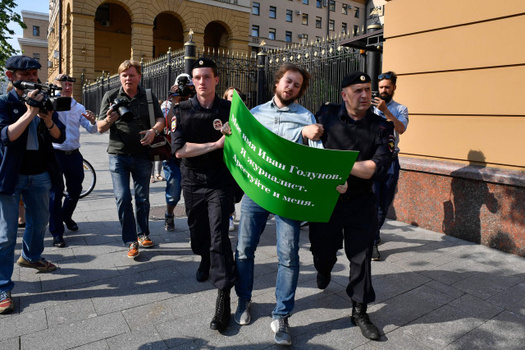

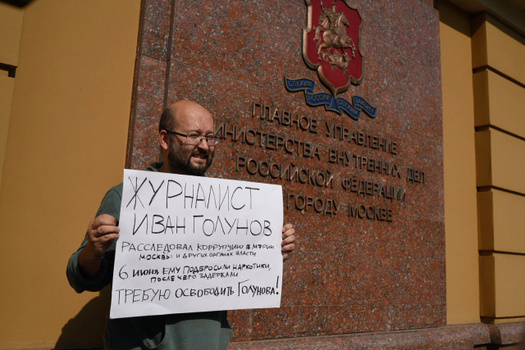
Alisa Kustikova managed to hide her poster and avoid being arrested.
“I came because I’m an investigative reporter. Ivan Golunov is the kind of person I look up to. He does very cool work with sources and data. I think what happened yesterday is an attack and an incident tied directly to his work as a journalist. We have to fight for our professional rights. That’s why I consider it my duty to support Ivan,” Kustikova told Meduza.
As they arrest the journalists, the police also seize their posters, but new picketers quickly replace those who are taken away. “This is a disgusting, fabricated case. It’s revenge for Ivan Golunov’s investigative reporting. [...] Any decent person must oppose this,” says literary critic Anna Narinskaya.
“What are you standing there for? Take [her] away!” explodes a voice on the police radio. The officers near Narinskaya don’t budge at first, and they only ask her to follow them to a police bus after several more rounds of screaming blast from their radio.
Former Meduza deputy chief editor Alexander Gorbachev gets slightly different treatment: the officers arrest him almost the instant he stands outside the police headquarters with his poster. Soon, two buses full of demonstrators set off for the Tverskaya station to draw up paperwork for misdemeanor charges of violating Russia’s rules on public assemblies, but in the end the journalists are released without even a formal report. After going free, many of them return immediately to 38 Petrovka Street.
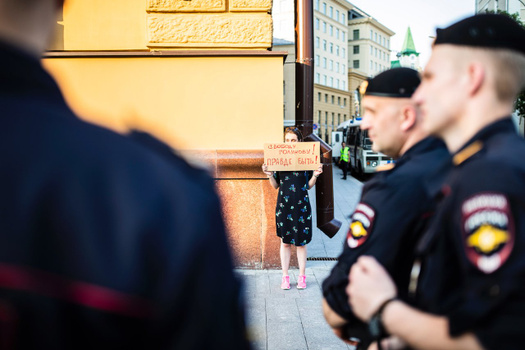
By six in the evening, a proper crowd as assembled outside the police headquarters. Some arrive with posters already made, while others write out new slogans on pieces of cardboard and sheets of paper. “The officers took my poster, and now I’m writing another one,” says Takie Dela editor-in-chief Anastasia Lotareva, explaining that she’s come to the picket because she views it as a question of professional solidarity.
More and more people wishing to take part in the picket keep showing up, and eventually they decide to form a line. The police assist in this process, asking everyone to stand to the side and not obstruct pedestrian traffic. As a result, the line stretches almost from the building’s entrance to its other end, with picketers standing at the corners. A young man named Denis Zakharov turns several heads with his poster, which contains no writing, except for a QR-code that directs people to Ivan Golunov’s articles, when scanned with a smartphone.
“The main thing is for people to read [Golunov’s articles]. Because these articles are the most important thing in this story,” Zakharov explains. “I came here because it’s very difficult. There’s nothing to read, and [Ivan Golunov] is a good guy, who wrote good things, the right things. When people like this [are arrested], you want to turn out.”
People continue to converge at 38 Petrovka Street. Some bring bottles and canisters of water for the protesters, along with apples and disposable cups. The supplies are left outside the police department’s fence.
Documentary filmmaker Olga Stefanova says she was brought to the demonstration by a sense of “pain for the people who are trying to fight for truth, and the fact that they’re being treated like animals,” and by the desire “to share this struggle for truth, and stand beside it.”
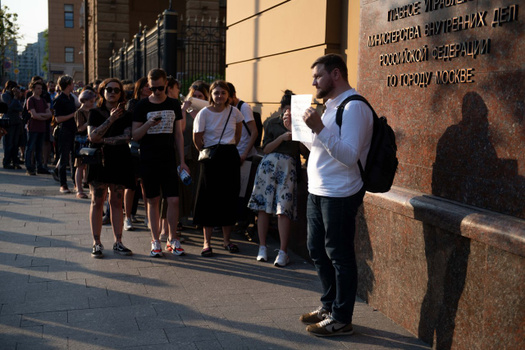
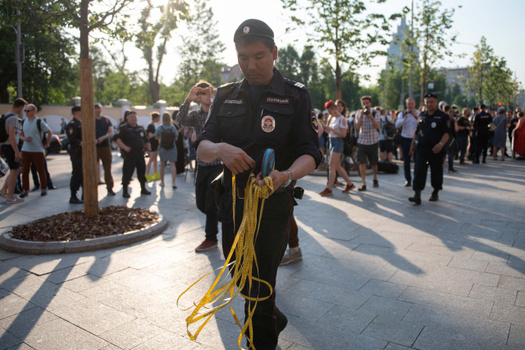
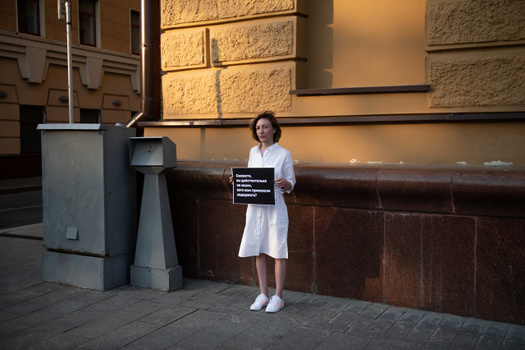
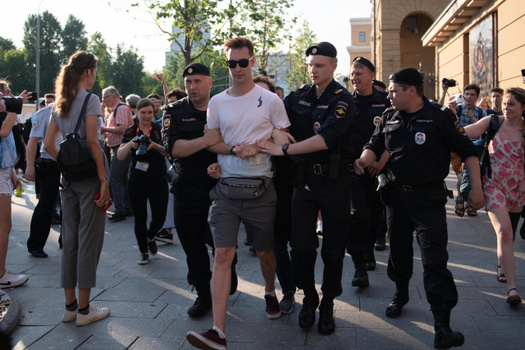
After a brief disappearance, the police return with a tape measure. They measure the distances between various picketers, and then start arresting people again, packing into police vans Basmanny District municipal deputy Viktor Kotov, journalist Vladimir Kheifets, and activists Darya Polyudova, Daniil Shadymov, and Alexey Klimishin. These individuals are later brought to another police station, where they’ll be charged formally with violating Russia’s public-assembly laws.
Despite the new round of arrests, more people are still arriving to join the picket. The wait in line is now at least an hour, but nobody seems to mind. “I’ll stand in two of these lines to say ‘FREE GOLUNOV,’” says one sign. Other slogans include: “My name is Ivan Golunov. I am a journalist. Arrest me, too”; “Stop planting drugs”; and “Guys, you can’t do this!”
Journalist Vladimir Maksakov carries a sign that reads, “Please free Ivan Golunov! Sincerely, the King of Westeros.” Maksakov says he’s joining the picket because it’s his only opportunity to express his feelings about his colleague’s arrest. “It’s clear that the case is completely fabricated, but to go so far… It’s beyond all the bounds of good and evil,” Maksakov says.
“Sometimes in life there are injustices. There are tragedies, like last year in Kemerovo. Now it’s the situation with Golunov,” says Yuri Bolotov, who works at the Russian tech giant Yandex. “These events are sad in themselves. At the same time, you believe that you live in a modern country, in something of a civilized society. And then this happens, and you realize how untrue that is. You can’t be proud of a country where this happens.”
Bolotov says the reality in Russia is that individuals who take revenge on troublesome journalists are rarely punished for these actions. On the contrary, “they resign from toxic gubernatorial posts and get promoted to United Russia’s leadership. If this happens one more time, if the people who are doing this to Golunov, aren’t punished… I’ll need to leave [the country],” Yuri Bolotov says.
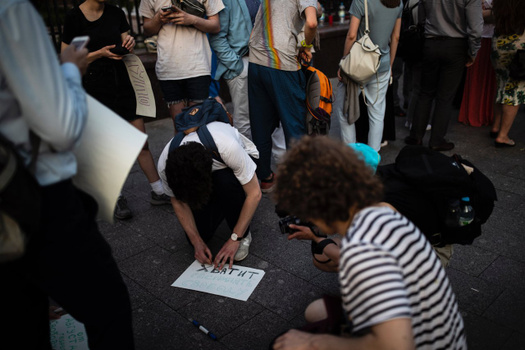
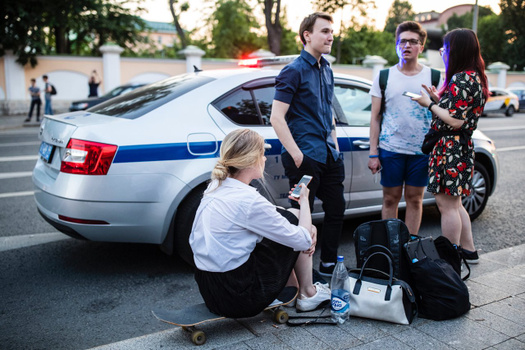
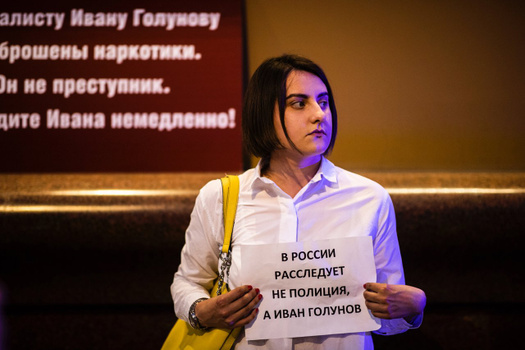
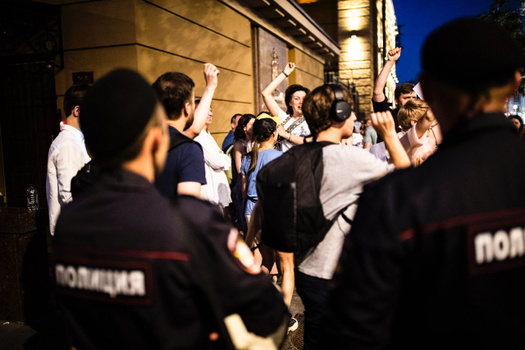
By 11 p.m., six hours into the demonstration, people are still lining up to join the picket. The police mobilize once again, and try to disperse the crowd using the water hoses on a street-cleaner truck. The attempt backfires: demonstrators wilting in the summer heat embrace the sudden cool. Officers then turn on their megaphones and hold them up to their radios, broadcasting a sharp, unpleasant noise that echoes down the street. In response, picketers start to sing along, dancing and smiling.
Members of the crowd chime in with jokes:
“This DJ set is shit. Next song!”
“What’s with the audio-narcotics?”
“An experimental noise concept in support of Ivan Golunov!”
After 30 minutes, the police abandon their effort to break up the picket, and retreat to the nearby side streets. On the other side of the road, a woman holding a sign chants, “Free him! Free him!”
Midnight arrives, and there’s still a line outside 38 Petrovka Street.
Report by Kristina Safonova
Translation by Kevin Rothrock